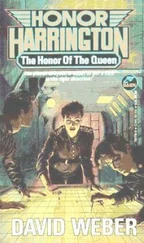She walked along the clothesline, blinking against the bright sunlight, her short hair-auburn now, not black-blowing on the brisk breeze that flapped the sheets and towels pinned to the line. The vanes of the mushroom-headed ventilators whirred, and she enjoyed the warmth on her skin. She tested each sheet, each towel, for dampness with her hand, thus explaining to anyone who happened to glance in her direction what routine, harmless task had brought her to the roof at this particular moment.
She glanced at her chrono. That was one of her few concessions to her role of terrorist commander. It was a very good chrono, worth more than a full year of her one-sun apartment's rent. But she'd had that expensive timepiece remounted in a cheap, battered case suited to the sort of chrono a poverty-stricken widow might reasonably possess. She didn't care what it looked like; only that it kept perfect time.
Which it did.
The first explosion thundered across the capital precisely on schedule. A thick cloud of debris, flame, and smoke shot up near the city's center, and Nordbrandt ran to the front edge of the one-sun's roof. There was no risk of giving herself away now-everyone who could was moving, craning her neck, trying to see what was happening. Indeed, she'd have aroused suspicion if she hadn't rushed to stare off towards the plume of smoke rising out of the swelling mushroom of dust.
Then the second explosion bellowed.
The first had been a delivery truck, parked-in the same parking space in which it had been parked every day for the last three weeks-outside the main city post office. Had anybody examined that truck on any day except today, they would have found it loaded with legitimate parcels and packages being delivered to the post office by the courier service whose name was painted on its sides. But last night the courier service employee, who belonged to one of Nordbrandt's cells, had loaded his vehicle with something else before he parked it, set the timer, locked it, and walked away. And the truck had simply sat there, waiting until mid-afternoon, when the post office would be most crowded.
She shaded her eyes with her hand, staring towards the post office. Or, rather, towards the flaming, tumbled heap of rubble which had been the post office. She could see one or two people staggering around, clutching broken limbs or bleeding wounds. More lay writhing-or motionless-on the sidewalks, and half a dozen ground vehicles added their own smoke and flame to the hellish scene. Kornati's tech base was sufficiently primitive that most vehicles still used petrochemical fuels, and tendrils of liquid fire flowed across the pavement, seeking the storm drains, as bleeding fuel tanks gushed flame. And she could see other people already beginning to rip and tear at the wreckage in frantic efforts to rescue anyone who might be trapped under it.
Gutsy of them, a cold, thoughtful corner of her brain acknowledged. Especially after the way we set up the Nemanja bombing. Maybe it's time we started setting follow-up charges again.
She turned her attention towards the second explosion, but it was farther away. She could see the smoke, hear sirens, but she couldn't actually see anything. Not that she needed to. Another truck, from the same courier service, had been parked in a basement garage under the city's largest department store. Judging from the smoke and dust cloud, the bomb must have been even more successful than she'd hoped.
Then the third bomb detonated-the one in the stolen ambulance parked under the marquee of the Sadik Kozarcanic Army Hospital. She'd had her doubts about that one. There'd been a far higher chance that the team charged with placing the ambulance would be detected and intercepted, which would have alerted the authorities to the fact that an operation was underway. And even if they weren't, security remained too tight, despite the growing certainty she and the Movement had both been killed, for them to get the ambulance close enough to do the kind of structural damage they'd managed at the post office and department store. But she'd decided it was still worth the risk as a psychological blow. They hadn't attacked hospitals before. And, in fact, she had no intention of adding hospitals to the list. Not civilian hospitals, anyway. But there was no way for the government or the general public to know that, now was there?
The fourth bomb went off, but it was clear across the city, too far away for her to see it from here. Not that she needed to. The neat operational planning file in her head checked it off as sharp, harsh thunder rattled the one-sun's windows.
First Planetary Bank, she thought cheerfully. Again, they hadn't been able to get the bomb actually inside the building perimeter, and the Bank building itself was built more like a bunker than a commercial establishment. But, knowing they wouldn't be able to place the bomb as close as they wanted, she and Drazen Divkovic, Juras' brother, had put the bomb under a tanker truck. In theory, it contained fuel oil; in fact, Drazen had sealed the tank and filled it with natural gas, creating what was in effect a primitive fuel-air bomb.
Then Drazen himself had driven the truck into position, stopped it, gotten out, and opened the hood to bend over the turbine, obviously checking for malfunction. He'd tinkered with it until he heard the first explosion. Then he'd smashed the fuel line with a single, carefully placed blow from a wrench, to make sure no one else could drive it away, and vanished into a subway station. By the time anyone realized the "driver" had abandoned his truck, Drazen had been kilometers away. And by then it was much too late for anyone to move the deadly vehicle before it exploded like a tactical nuclear warhead.
The vaults may survive. I don't think any of the rest of the building will, though.
She looked out at the plumes of smoke one more time, then, shaking her head in obvious disbelief and horror, turned and headed back towards the stairwell. She wanted to get back to her apartment and its cheap, tiny HD in time to see if the news channels played her prerecorded message claiming responsibility for the bombing attack in the name of the FAK. And, just incidentally, informing the Kornatian public that she wasn't dead, after all.
She was halfway down the stairs when the fifth and final bomb of this attack exploded in yet a third delivery truck. That one was parked outside the Karlovac Metropolitan Museum, and she spared a moment to hope the museum's fire suppression systems would save most of its artworks. It was probably a little schizophrenic to hope one of her own attacks would be less than totally successful, but she couldn't help it.
She shook her head at her own perversity as she reached the bottom of the stairs and checked her chrono again. Assuming her delivery arrangements worked, the news outlets wouldn't have her recorded message for another few minutes. It would be interesting to see how long it took the first news service to get it on the air.
And while she waited, she just had time to check the turkey again and put the bread into the other oven.
"So much for the demise of the Freedom Alliance," Baroness Medusa said bitterly.
Gregor O'Shaughnessy simply nodded. There wasn't much else to do as he and the Provisional Governor watched the news clips which Colonel Basaricek had appended to her official report.
It was bad, he thought. Worse even than the Nemanja bombing. The casualty count was higher, the damage was spread across a wider area of the city and-especially in the area of that tank truck bomb-far more severe, and the sheer psychological shock effect after the extended false calm was equally severe. The commentary on the news clips Basaricek had included carried a new, harsher flavor than the reportage before Nordbrandt's assumed death had. Much of that anger was directed at the FAK, but a disturbing amount of it was aimed squarely at the Kornatian government this time.
Читать дальше












